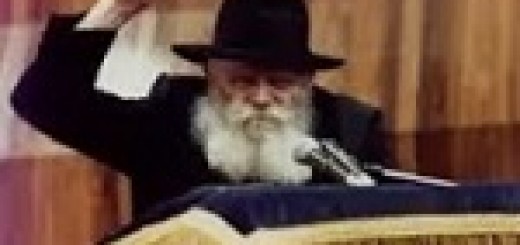By Rabbi Akiva Wagner
The following story was told to me by R’ Mendel Aronow:
The Tzemach Tzedek was not only a Rebbe of Chassidim and of Klal Yisroel, but also one of the foremost poskim of his generation, and thousands of people from all walks of Yiddishkeit turned to him with countless Halachik queries (some of the responses became the Teshuvos Tzemach Tzedek). Due to his many preoccupations, the Rebbe did not have the time to deal with each query personally; he therefore appointed his son to read the questions and write a response. The Tzemach Tzedek would then review each Teshuva, which was only sent out upon his approval.
[There was a similar arrangement when the Tzemach Tzedek was younger, during the nesius of the Mitteler Rebbe. Then the Tzemach Tzedek was assigned the job of writing the Teshuvos which would then be brought to the Mitteler Rebbe for approval. Once, there was a question requiring an urgent response, and the Rebbe was not available. In view of the fact that the Mitteler Rebbe had never taken issue with anything that the Tzemach Tzedek had written, and taking into consideration that it was a pressing issue, the Tzemach Tzedek decided, just this once, to send it out on his own.
Later, the Mitteler Rebbe asked what happened with the said Teshuva. When the Tzemach Tzedek informed him that he had sent it out, the Rebbe asked him what he had responded. When the Tzemach Tzedek told him, the Mitteler Rebbe pointed out that this Teshuva was incorrect, and had overlooked an explicit Tosefos.
The Tzemach Tzedek, understandably, was devastated about the fact that he could make such a mistake. But the Mitteler Rebbe comforted him, saying “What do you expect, you are (after all) not yet a Rebbe”. But more on that story some other time bli”n]
Once there was a complex shailoh regarding an agunah. The MaHaRiN researched it extensively, and concluded that the unfortunate woman can be permitted to remarry, in other words, there is considered ample grounds halachikally to determine that her husband is no longer alive. He wrote a lengthy teshuva, in which he quoted from numerous sources that supported his conclusion, and he brought it to his father for approval.
The Tzemach Tzedek began reading the Teshuva, while his son sat near him, observing his reaction. Presently, the MaHaRiN noticed his father showing an expression of displeasure.
“Father”, he immediately inquired, what troubles you, do you not agree with the support that I brought from tosefos”
“It’s not that”, replied the Tzemach Tzedek, “your support from tosefos is very sound”. And the Tzemach Tzedek read on, but before long, his son noticed from his facial expression that he again appeared displeased with the Teshuva. “What is it father”, asked the son, “do you feel that my comparison to the ruling of the shach is not valid?”
“No, my son”, his father reassured him, “the comparison that you drew to the ruling of the shach is irrefutable”. But as the Tzemach Tzedek read on, it was more and more apparent that the response was not finding favor in his eyes. Finally, his son could no longer contain himself, and he exclaimed: “Father, I will not allow you to continue, until you reveal to me what troubles you about what I wrote!”
The Tzemach Tzedek explained: “My child, all that you wrote is sound and unarguable, ober vos ken ich ton az ich zeh doch az er lebt!” [But what can I do, I see that the husband is alive, (and the wife, therefore, may not remarry)].
We are all, perhaps, in a similar situation. We are regularly presented with complex teshuvos, with irrefutable “proofs” as to what’s alive and what’s not alive. People tell you “Get a life”! Because you have to live a little bit. And as the summer approaches its all-too-soon end, we worry, did we take enough advantage of the opportunity to “live it up” a bit. Did we manage to take a long enough vacation and indulge in enough pleasurable activities to justify returning to our “routine”.
But the Torah tells us what life really is. “Hashem Elokim emes hu Elokim chayim”! G-dliness is life and truth, as the Rambam writes, ‘there is no other true existence other than Him’.
We have the ability to ‘get a life’, – to ‘live it up’ as well. “VeAtem hadveikim beHashem… chayim kulchem hayom”. When we attach ourselves and associate ourselves with G-dliness, then, and only then, are we really and truly living it up. Anything that is not part of our relationship with Elokus (not to mention those things that ch”v separate between us and Hashem) are not life.
The question is, how do we effectively counter-act the opposite message that we’re being bombarded with on a regular basis by the world around us? How do I convince myself that strengthening my commitment to a scheduled learning of nigleh or chassidus, that my uncompromising dedication to daven with a minyan will make more of a difference in my life and that of my family than earning enough money to buy some dump in a prestigious bungalow colony? There seems, after all, to be so many “proofs” that I’m only being a good husband or father if I can provide my family with the fanciest home and the newest Lexus, how can I think of disagreeing with them? After all, in the world today success is measured by owning the latest i-pad and i-touch and i-phone and I-everything except what i-am really supposed to do [when Yidden throughout the generations would give a krechtze from the depths of their souls, while exclaiming “ay ay ay”, they must have been having a prophetic vision of the terrible haalomos vehesterim of ikveso d’mshicho, that take the form of the various i-shmontzes lemineihem].
We’ll, it’s one thing to try and bring scholarly arguments that support the righteousness of our path. But when the approach is with logic, then every argument has a counter-argument, and it’s very difficult to arrive at a convincing conclusion. You can philosophize and philosophize and not get anywhere.
But there is a much more effective approach. Which to see the truth. Because when we see something clearly, then there is no proof in the world that can convince us otherwise. And we can all clearly see that the only true life and existence is G-dliness. You don’t need to be a Rebbe or a Tzaddik to share in this vision. Every single Jewish person has a neshomo that is in tune with Elokus. The essence of the neshomo, the nekudas hachochma, relates with G-dliness in a way of “re’iyah” – sight. It is a vision that is clearly and readily available to us.
But we need to focus on it.
This is what the Torah tells us in this week’s Parsha: Re’eh. See. Look, and see. Don’t just philosophize and pontificate. Don’t base yourself only on solid arguments and powerful lines. Rather, RE’EH! See for yourself. Look, and see, so that nothing in the world can distract you or confuse you.
And what should we see? “Anoichi”. The essence of the Eibishter, that is beyond reason or intellect. To see with our own eyes the One and Only ultimate truth.
To do this, it is necessary for us to do our part, to look at what we’re supposed to be looking at, to see what we’re able to see. To keep our focus in the right place. Which means – first and foremost – not looking where we’re not supposed to look, because if we’re looking in the wrong places (and I’m sure you know where they are . . .) then there’s not much chance that we’ll come out seeing the right things.
But it’s also to take positive steps to help ourselves focus. Just as we sometimes need tools, whether glasses or magnifying glass or just shading out eyes with our hands, to help our eyes focus on a given point, so too we may need to help the eyes of our neshomo to stay focused.
And what helps them to (get focused and) stay focused are learning and davening. The more we immerse ourselves in learning and davening, the clearer we cause our spiritual vision to be, and the clearer it becomes to us that the only worthwhile existence is one of connection with G-dliness.
Which is – learning and davening.
So, as we approach Shabbos Re’eh, and bentch the month of Ellul, let us each strengthen our souls’ eyesight, by increasing a little bit more (and yes, there’s always a little room for a little increase) in learning nigleh, increasing a little bit more in learning chassidus, and putting a little bit more effort into our avodas hatefilla.
Because our Yiddishkeit and chassidishkeit are not based on any philosophy, as convincing as it may be, but rather it is (should be) something we can clearly see. Therefore, all the arguments that the world around us proclaims have no effect on us at all.
Because “vos ken ich ton az ich zeh doch az er lebt!”
L’chaim! May we all cure any deficiencies in our spiritual vision, through focusing on Elokus, and may the Eibishter in turn do His part to cure our vision and bring about the fulfillment of “Re’eH” anoichi”, through bringing us immediately the revelation of the Geulah, when “Ayin b’Ayin yiru”, “vesechezeno eineinu”, through the hisgalus of Moshiach Tzidkeinu TUMYM!!!
Rabbi Akiva Wagner is the Rosh Yeshivah and dean of Yeshivas Lubavitch Toronto. He is known for his brilliant lectures and his passionate farbrengens. As a fiery example of what a chassid ought to be, he serves as a mentor for thousands.






















